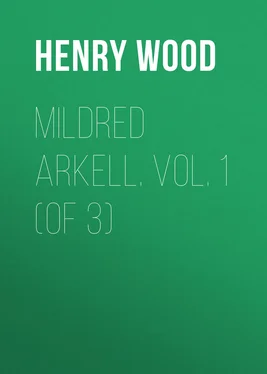Henry Wood - Mildred Arkell. Vol. 1 (of 3)
Здесь есть возможность читать онлайн «Henry Wood - Mildred Arkell. Vol. 1 (of 3)» — ознакомительный отрывок электронной книги совершенно бесплатно, а после прочтения отрывка купить полную версию. В некоторых случаях можно слушать аудио, скачать через торрент в формате fb2 и присутствует краткое содержание. Жанр: foreign_sf, literature_19, foreign_antique, foreign_prose, на английском языке. Описание произведения, (предисловие) а так же отзывы посетителей доступны на портале библиотеки ЛибКат.
- Название:Mildred Arkell. Vol. 1 (of 3)
- Автор:
- Жанр:
- Год:неизвестен
- ISBN:нет данных
- Рейтинг книги:4 / 5. Голосов: 1
-
Избранное:Добавить в избранное
- Отзывы:
-
Ваша оценка:
- 80
- 1
- 2
- 3
- 4
- 5
Mildred Arkell. Vol. 1 (of 3): краткое содержание, описание и аннотация
Предлагаем к чтению аннотацию, описание, краткое содержание или предисловие (зависит от того, что написал сам автор книги «Mildred Arkell. Vol. 1 (of 3)»). Если вы не нашли необходимую информацию о книге — напишите в комментариях, мы постараемся отыскать её.
Mildred Arkell. Vol. 1 (of 3) — читать онлайн ознакомительный отрывок
Ниже представлен текст книги, разбитый по страницам. Система сохранения места последней прочитанной страницы, позволяет с удобством читать онлайн бесплатно книгу «Mildred Arkell. Vol. 1 (of 3)», без необходимости каждый раз заново искать на чём Вы остановились. Поставьте закладку, и сможете в любой момент перейти на страницу, на которой закончили чтение.
Интервал:
Закладка:
"You will be rendering me a service which I shan't forget, Arkell. If Philip will drive me over–"
"Philip! Do you want Philip with you?"
"Philip must go to bring back the carriage; I shan't return until the afternoon. Why, he will be there and home again almost before Mr. Arkell's up. I must go pretty early."
This, the going of Philip, appeared to simplify the matter greatly. To allow Robert Carr or anyone else to take the carriage off for a day without permission was one thing; for Philip to drive him to Purford early in the morning, and be back again directly, was another. "I think you may have it, Carr," he said; "but if my father misses the carriage and Philip—as he is sure to do—and asks where they are–"
"Oh, you may tell him then," interrupted Robert Carr.
"Very well. Shall Philip bring the carriage to your house?"
"No need of that; I'll come here and get up. I'd better speak to Philip myself. Don't stay out any longer in the cold, Arkell. Good night, and thank you."
William went indoors; and Robert Carr sought Philip in the stable to give him his instructions for the morning.
CHAPTER V.
THE FLIGHT
In a quiet and remote street of the city was situated the house of Mr. Carr. Robert Carr walked towards it, with a moody look upon his face, after quitting William Arkell—a plain, dull-looking house, as seen from the street, presenting little in aspect beyond a dead wall, for most of the windows looked the other way, or on to the side garden—but a perfect bijou of a house inside, all on a small scale, with stained glass illuminating the hall, and statues and pictures ornamenting the rooms. The fretwork in the hall, and the devices on the windows—bright in colours when the sun shone through them, but otherwise dark and sombre—imparted the idea of a miniature chapel, when seen by a stranger for the first time. Old Mr. Carr had spent much time and money on his house, and was proud of it.
Robert swung himself in at the outer door in the wall, and then in at the hall door, which he shut with a bang; things, in fact, had arrived at a pitch of discomfort between him and his father hardly bearable by the temper of either. Neither would give way—neither would conciliate the other in the smallest degree. The disputes—arising, in the first place, from Robert's extravagance and unsteady habits—had continued for some years now; but during the past two or three months they had increased both in frequency and violence. Robert was idle—Robert spent—Robert did hardly anything that he ought to do, as member of a respectable community; these complaints made the basis of the foundation in all the disputes. But graver sins, in old Mr. Carr's eyes, of some special nature or other, cropped up to the surface from time to time. Latterly, the grievance had been this acquaintance of Robert's with Martha Ann Hughes; and it may really be questioned whether Robert, in his obstinate spirit, did not continue it on purpose to vex his father.
On the Tuesday (this was Thursday, remember) Robert had been, to use his father's expression, "swinging about all day"—meaning that Mr. Robert had passed it out of doors, nobody knew where, only going in to his meals. Their hours were early—as indeed was the general custom at Westerbury, and elsewhere, also, in those days—dinner at one o'clock, tea at five. About half-past four, on the Tuesday, Robert had gone in, ordered himself some tea made at once, and something to eat with it, and then went out again, taking a warm travelling rug, and telling the servant to say he was gone to London. And he proceeded to the coach-office, took his seat in the mail, then on the point of starting, and departed.
Mr. Carr came in from the manufactory at five to his tea, and received the message—"Mr. Robert had gone to London by the mail." He was very wroth. It was an independent, off-hand mode of action, calculated to displease most fathers; but it was not the first time, by several, that Robert had been guilty of it. "He's gone off to spend that money," cried Mr. Carr, savagely; "and he won't come back until there's not a farthing of it left." Mr. Carr alluded to a hundred pounds which Robert had received not many days previously. A twelvemonth before, an uncle of Mr. Carr's and of Squire Carr's had died, leaving Robert Carr a legacy of a hundred pounds, and the same sum between the two sons of Mr. John Carr. This, of course, was productive of a great deal of heart-burning and jealousy in the Squire's family, that Robert should have the most; but it has nothing to do with our history just now. At the expiration of a year from the time of the death, the legacies were paid, and Robert had been in possession of his since the previous Saturday.
"He's gone to spend the money," Mr. Carr repeated. No very far-fetched conclusion; and Mr. Carr got over his wrath, or bottled it up, in the best way he could. He certainly did not expect Robert back again for a month at least; very considerably astonished, therefore, was he, to find Mr. Robert arrive back by the mail that took him, and walk coolly in to breakfast on the Thursday morning, having only stayed a few hours in London. A little light skirmishing took place then—not much. Robert said he had been to London to see a friend, and, having seen him, came back again; and that was all Mr. Carr could obtain. For a wonder, Robert spent the morning in the manufactory, but not in the presence of his father, who was shut in his private room. At dinner they met again, and before the meal was over the quarrel was renewed. It grew to a serious height. The old housekeeper, who had been in her place ever since the death of Mrs. Carr, years before, grew frightened, and stole to the door with trembling limbs and white lips. The clock struck three before it was over; and, in one sense, it was not over then. Robert burst out of the room in its very midst, an oath upon his lips, and strode into the street. Where he passed the time that afternoon until five o'clock could never be traced. Mr. Carr endeavoured afterwards to ascertain, and could not. Mr. Carr's opinion, to his dying day, was that he passed it at Edward Hughes's house; but Miss Hughes positively denied it, and she was by nature truthful. She stated freely that Robert Carr had called in that afternoon, and was for a few minutes alone with Martha Ann, she herself being upstairs at the time; but he left again directly. At five o'clock, as we have seen, he was with William Arkell, and then he went straight home.
Mr. Carr had nearly finished tea when he got in. The meal was taken in a small, snug room, at the end of the hall—a round room, whose windows opened upon the garden in summer, but were closed in now behind their crimson-velvet curtains.
Robert sat down in silence. He looked in the tea-pot, saw that it was nearly empty, and rang the bell to order fresh tea to be made for him. Whether the little assumption of authority (though it was no unusual circumstance) was distasteful to Mr. Carr, and put him further out of temper, cannot be told; one thing is certain, that he—he, the father—took up again the quarrel.
It was not a seemly one. Less loud than it had been at dinner-time, the tones on either side were graver, the anger more real and compressed. It seemed too deep for noise. An hour or so of this unhappy state of things, during which many, many bitter words were said by both, and then Robert rose.
"Remember," he said to his father, in a low, firm tone, "if I am driven from my home and my native place by this conduct of yours, I swear that I will never come back to it."
"And do you hear me swear," retorted Mr. Carr, in the same quiet, concentrated voice of passion, "if you marry that girl, Martha Ann Hughes, not one penny of my money or property shall you ever inherit; and you know that I will keep my word."
Читать дальшеИнтервал:
Закладка:
Похожие книги на «Mildred Arkell. Vol. 1 (of 3)»
Представляем Вашему вниманию похожие книги на «Mildred Arkell. Vol. 1 (of 3)» списком для выбора. Мы отобрали схожую по названию и смыслу литературу в надежде предоставить читателям больше вариантов отыскать новые, интересные, ещё непрочитанные произведения.
Обсуждение, отзывы о книге «Mildred Arkell. Vol. 1 (of 3)» и просто собственные мнения читателей. Оставьте ваши комментарии, напишите, что Вы думаете о произведении, его смысле или главных героях. Укажите что конкретно понравилось, а что нет, и почему Вы так считаете.












